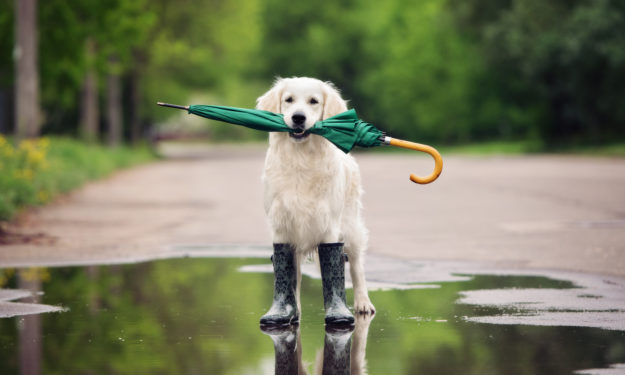With Rain Brings…Germs

Pluviophile: (n) a lover of rain; someone who finds joy and peace of mind during a rainy day. (Collin’s English Dictionary)
While cats clearly don’t fall into this category (not sane ones anyways), many dogs and owners alike do seem to revel in going for walks on rainy days. While this activity can be super beneficial for a stir crazy pet, a bit of caution should be utilized when it comes to allowing your pets to drink out of puddles and rain runoff. Even seemingly clear, fresh flowing rainfall can be a proverbial cesspool microscopically, harboring many germs and toxins that could make your pet incredibly ill.
Leptospirosis, giardia, and antifreeze are three such hazards which are prevalent this time of year, as they are either used to winterize household items (and then inadvertently drained onto sidewalks and such), or they are organisms that flourish in wet conditions.
- Leptospira is a bacterium that is shed in the urine of infected animals. Rodents, coyotes, deer and other wildlife, as well as more domesticated animals such as livestock, unintentionally can harbor this, and it can wind up in water anywhere – even in residential neighborhoods! Leptospirosis is especially harmful to your pets liver and kidneys, but it can present with a varying degree of symptoms ranging from fever, muscle stiffness, jaundice and anorexia. Since leptospirosis is a bacterial infection, antibiotics (and in severe cases) hospitalization, is used to treat the infection.
- Giardia is a protozoan parasite, which unlike lepto, is shed in the feces of infected animals. If giardia is accidentally ingested by your pet, the parasites will begin to wreak havoc on their small intestines, causing fairly severe GI symptoms which can lead to dehydration and weight loss, only to be reintroduced back into the environment via their stool, in the form of microscopic cysts…and thus the cycle repeats itself. Giardia and lepto are both considered to be zoonotic diseases, which means that they aren’t host specific, so yep – you can catch both of these from Fido…Luckily anti-parasitic medication can kill these bugs, but once the cysts are shed in the home environment, they can be very hard to fully eradicate.
- Antifreeze is of course the toxin on this list, which is that stuff you add to your car to help lower the freezing point of water based liquids. What makes antifreeze so toxic to pets is the active ingredient ethylene glycol. Unfortunately, ethylene glycol has a sweet, almost syrupy taste to it, so dogs and cats alike find it extremely palatable. It is so toxic in fact, that less than 3oz of ethylene glycol only needs to be ingested to cause a fatal reaction in a medium sized dog! Antifreeze toxicity affects the major organs of the body such as the brain, kidney and liver, with symptoms varying in range from ataxia (wobbly gait), vomiting, lethargy, seizures to even comas. If you suspect that your pet has ingested even the smallest amount of ethylene glycol, immediate medical attention is absolutely paramount.
Obviously, these threats to your pet aren’t everywhere, and this isn’t to discourage your four legged friend from frolicking in the rain…but bringing your own water supply for them to drink, or at the very least, being aware of your surroundings if your pet does drink from puddles, can go a long way with regards to their safety. Here’s to plenty of “ ‘Howling’ in the Rain” this fall!